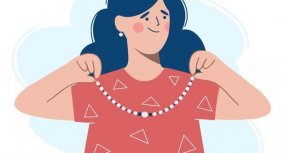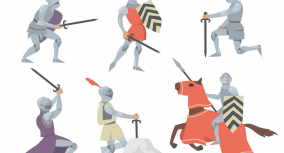The Necklace is a sensational story with an unexpected twist in the end. In the article, we will discuss theme of The Necklace by Guy de Maupassant. The literary analysis will show their importance for a better understanding of the story. The Necklace themes include Appearance vs. Reality and Greed.
So, let’s dive deeper into the theme of The Necklace!

Appearance vs. Reality
In The Necklace, the author highlights that appearance is often distinct from reality. The main character, Mathilde Loisel, seems to have trouble distinguishing between those. From the very beginning, she fantasizes that the world of wealthy people drastically differs from the one she lives in. Unlike his wife, Monsieur Loisel doesn’t daydream. Her husband enjoys the soup on the table while she dreams of exquisite dishes.
The impression that her appearance is an indicator of belonging to high society haunts her all her life. She dreams that her good looks and charm will lead her to a wealthy life. Her perception of wealthy people is enough for Mathilde to consider herself one of them.
The night at the ball turns out to be the best night of her life. Even though that night turns her life upside down for the next ten years, she believes she is in the right place. Yet, she only looks like those people without actually being one of them.
After losing the necklace, the main character decides to withhold the information about the loss from its owner. This lie then becomes the main reason for her problems. Mathilde tried so hard to appear wealthy and respected using her appearance that she lost her good looks completely when reality had hit.
Maupassant describes poverty and harsh reality, in which Mathilde and her husband ended up after buying the necklace, with great detail. This description is opposed to the depiction of the ball. The night of the ball was like a dream come true for the main character. Yet, it was a dream turned into a catastrophe.
By the end of the story, Mathilde meets Madame Forestier, who lent her the necklace. From the conversation, Madame Loisel learns that the diamonds were fake. The fakeness shows Madame Forestier in a different light. While the main character believed that people of higher social class are wealthy, her friend thought differently. It was the illusion that the appearance of wealth heavily relied on. Being rich is less crucial than appearing wealthy to others.
Quotes about Appearance vs. Reality
- “No . . . there’s nothing so humiliating as looking poor in the middle of a lot of rich women.”
(The Necklace, p.2) - “She suffered endlessly, feeling herself born for every delicacy and luxury. She suffered from the poorness of her house, from its mean walls, worn chairs, and ugly curtains. All these things, of which other women of her class would not even have been aware, tormented and insulted her.”
(The Necklace, p.1) - “He threw over her shoulders the garments he had brought for them to go home in, modest everyday clothes, whose poverty clashed with the beauty of the ball- dress. She was conscious of this and was anxious to hurry away, so that she should not be noticed by the other women putting on their costly furs.”
(The Necklace, p.3) - “Madame Forestier, deeply moved, took her two hands. “Oh, my poor Mathilde! But mine was imitation. It was worth at the very most five hundred francs!”
(The Necklace, p. 5)
Greed
Greed and how it can lead to one’s downfall is the central idea of The Necklace. The problems in the story are related to the main character’s desire for wealth and luxury. Mathilde is unhappy with her life, mostly due to her social and financial status. She believes that she is in the wrong place and wishes for more.
But why? What are the reasons for her desire for material objects? Madame Loisel is not poor from the start of the story. Yes, she and her husband live quite modestly, but they have all the necessary aspects for a good life. So, why does the main character have so much greed? Why do her desires don’t comply with her abilities?
Already at that time, people dreamt of things out of their financial reach. Instead of enjoying the comfort of the possessed, people wanted something more expensive. Maupassant provides a clear example of that in the story. When choosing accessories for the ball, Mathilde could buy cheap flowers to look more fashionable. However, she decided against it. Flowers weren’t visibly expensive.
Another example concerns the price of the dress. Madame Loisel asked for 400 francs for an evening dress to go to the ball. That was an exact amount of money Monsieur Loisel has been saving. The objects have equal monetary value, yet choosing how to spend the funds reflects a person’s moral and social values. Buying a dress is an irrational choice. Yet, Mathilde does it to look wealthier in the eyes of the others.
Additionally, Mathilde has pride and ambition. Her beauty absorbs her. Her concentration on her appearance makes her disgusted with her current life. She truly believes that with her appearance, having no luxury and wealth is beneath her dignity.
Lastly, her desire for wealth is highly dependent on the role of women in society. Women were seen as decoration. Therefore, a woman was supposed to be in the place in compliance with her womanly virtues. Mathilde, in her opinion, was in the wrong place. That means that she wasn’t fulfilling her primary female function, influenced by the society of the 19th century.
Quotes about Greed
- “I’m utterly miserable at not having any jewels, not a single stone, to wear,” she replied. “I shall look absolutely no one. I would almost rather not go to the party.”
(The Necklace, p. 2) - “She came to know the heavy work of the house, the hateful duties of the kitchen. She washed the plates, wearing out her pink nails on the coarse pottery and the bottoms of pans. She washed the dirty linen, the shirts and dish-cloths, and hung them out to dry on a string; every morning she took the dustbin down into the street and carried up the water, stopping on each landing to get her breath. And, clad like a poor woman, she went to the fruiterer, to the grocer, to the butcher, a basket on her arm, haggling, insulted, fighting for every wretched halfpenny of her money.”
(The Necklace, p. 5) - “Suddenly she discovered, in a black satin case, a superb diamond necklace; her heart began to beat covetously. Her hands trembled as she lifted it. She fastened it round her neck, upon her high dress, and remained in ecstasy at sight of herself.”
(The Necklace, p.3) - “…she imagined delicate food served in marvellous dishes, murmured gallantries, listened to with an inscrutable smile as one trifled with the rosy flesh of trout or wings of asparagus chicken.”
(The Necklace, p.1)






